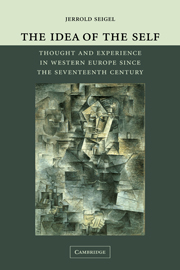Book contents
- Frontmatter
- Contents
- Acknowledgments
- PART I INTRODUCTORY
- PART II BRITISH MODERNITY
- PART III SOCIETY AND SELF-KNOWLEDGE: FRANCE FROM OLD REGIME TO RESTORATION
- PART IV THE WORLD AND THE SELF IN GERMAN IDEALISM
- 9 Autonomy, limitation, and the purposiveness of nature: Kant
- 10 Homology and Bildung: Herder, Humboldt, and Goethe
- 11 The ego and the world: Fichte, Novalis, and Schelling
- 12 Universal selfhood: Hegel
- PART V MODERN VISIONS AND ILLUSIONS
- Notes
- Index
11 - The ego and the world: Fichte, Novalis, and Schelling
Published online by Cambridge University Press: 05 June 2012
- Frontmatter
- Contents
- Acknowledgments
- PART I INTRODUCTORY
- PART II BRITISH MODERNITY
- PART III SOCIETY AND SELF-KNOWLEDGE: FRANCE FROM OLD REGIME TO RESTORATION
- PART IV THE WORLD AND THE SELF IN GERMAN IDEALISM
- 9 Autonomy, limitation, and the purposiveness of nature: Kant
- 10 Homology and Bildung: Herder, Humboldt, and Goethe
- 11 The ego and the world: Fichte, Novalis, and Schelling
- 12 Universal selfhood: Hegel
- PART V MODERN VISIONS AND ILLUSIONS
- Notes
- Index
Summary
Out of the combined legacy of Kantian philosophy and the organic vision of Bildung espoused by Herder and Goethe there developed a project that would leave a deep impress on modern thinking, namely to constitute the self as the means through which the whole world could be apprehended. The project was carried out in differing but related ways by some of the most remarkable figures in German thinking in the late eighteenth and early nineteenth centuries, in particular Johann Gottlieb Fichte, Friedrich Wilhelm Joseph Schelling, and Georg Wilhelm Friedrich Hegel. It required both a certain image of the self and a certain image of the world, rooted partly in the isomorphism of self and world instanced in Leibniz's universe of monads, and in its offspring, Herder's world of individuated life-forms nurturing their developing powers on the sympathetic world around them. But Leibniz and Herder were not the main impetus. On one level what both provided were modern versions of the classical universe of ordered substances animated by soul-forms, giving new life to the ancient homology between microcosm and macrocosm. Post-Kantian Idealism departed from that model, taking its bearings from Kant's “Copernican revolution,” which grounded human knowledge and morality in the structure of the rational ego, and not in the supposed architecture of the universe. Kant's successors drew on Leibniz, Herder, and Goethe, but their point of departure was the Kantian epistemological and moral centrality of the ego.
- Type
- Chapter
- Information
- The Idea of the SelfThought and Experience in Western Europe since the Seventeenth Century, pp. 361 - 390Publisher: Cambridge University PressPrint publication year: 2005

